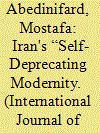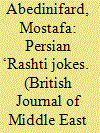|
|
|
Sort Order |
|
|
|
Items / Page
|
|
|
|
|
|
|
| Srl | Item |
| 1 |
ID:
181091


|
|
|
|
|
| Summary/Abstract |
Extant studies of Iranian nationalism accentuate the self-aggrandizing side of Iranian modernity, mainly achieved through, and informing, a process of otherizing certain non-Persians/Iranians, particularly the Arabs. I argue that equally important to understanding Iranian modernity is its lesser recognized, shameful and self-demeaning face, as manifested through a simultaneous 19th-century discourse, which I call “self-deprecating modernity.” This was an often self-ridiculing and shame-inducing, sometimes satirical, discourse featuring an emotion-driven and self-Orientalizing framework that developed out of many mid-nineteenth-century Iranian modernists’ obsessions with Europe's gaze; with self-surveillance; and with the perceived humiliation of Iranians through the ridiculing laughter of Other (especially European) nations at Iran's and Iranians’ expense. To explore this discourse, I re-examine the works of three pre-constitutionalist thinkers and writers within the broader sociopolitical context of late Qajar Iran, surveying their perspectives on shame, embarrassment, and ridiculing laughter, and showing how they were significantly informed by, while also helping to form, self-deprecating modernity. Given the strong, self-colonizing presumptions of this discourse, I conclude the article with a stress on the importance of re-exploring collective self-critical practices in modern Iranian history, culture, and literature with an eye toward decolonizing self-criticism.
|
|
|
|
|
|
|
|
|
|
|
|
|
|
|
|
| 2 |
ID:
168625


|
|
|
|
|
| Summary/Abstract |
For almost a century, a Persian ethnic joke cycle has circulated among Iranians about the men and women of the northern Iranian city of Rasht, labelling them as cuckolds and promiscuous women. A foray into the historical background and possible (gendered) functions of these jokes is long overdue. I argue that the central motif of Rashti jokes is gheyrat—a gendered social construct based on a man’s sense of honour, possessiveness and protectiveness towards certain female kin—which remains pivotal to our understanding of the texts and the historical context of the jokes. Critically reviewing extant theories on the historical origins of Rashti jokes, I argue they have roots in two modern phenomena: (a) debates among turn-of-the-twentieth-century Iranian thinkers over women’s (un)veiling; and (b) Reza Shah’s methodical promotion of an Aryanist, pan-Persian ideology. Focusing on the gender-disciplinary functions of the jokes, I then show how some contemporary Rashti jokes are deployed to project and inscribe gender-hierarchical notions that clearly surpass the jokes’ immediate, ethnic targets by commenting on broad socio-political topics. Such instances suggest that as a culture-wide joke cycle, Rashti jokes may also reinforce a form of Iranian masculinity obsessed with gheyrat-motivated control and aggression.
|
|
|
|
|
|
|
|
|
|
|
|
|
|
|
|
|
|
|
|
|